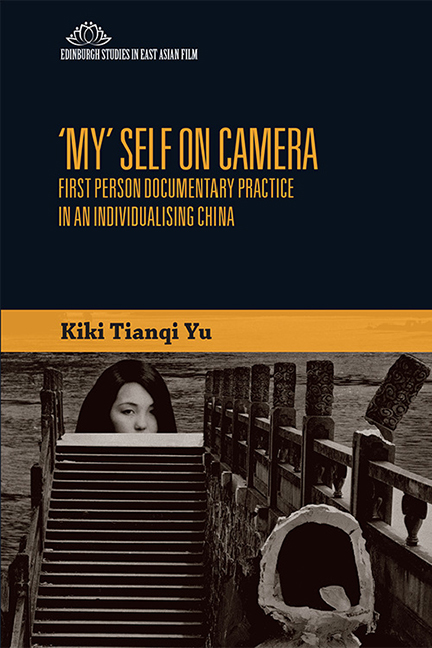Book contents
- Frontmatter
- Contents
- List of Figures
- List of Main Terms with Chinese Translations
- List of Names with Chinese Character Translations
- Acknowledgements
- Dedication
- Introduction: Action, Amateurness and the Changing Sense of the Individual Self
- 1 Female First Person Documentary Practice: Negotiating Gendered Expectations
- 2 Amateurness and an Inward Gaze at Home
- 3 Nostalgia toward Laojia: Old Home as an Imagined Past
- 4 First Person Action Documentary Practice: Longing for a More Politicised Space
- 5 The Problematic Public Self: Ethics, Camera and Language in Contestable Minjian Public Spaces
- 6 Camera Activism: Provocative Documentation, First Person Confrontation and Collective Force
- 7 Whose Self on Camera? Motives, Mistrust, Disputed Authenticities
- 8 From Fragile First Person Documentary Practice to Popular Online First Person Live Streaming Broadcast – Zhibo: Changing Intentions, Changing Individual Selves
- Filmography
- Bibliography
- Index
3 - Nostalgia toward Laojia: Old Home as an Imagined Past
Published online by Cambridge University Press: 10 November 2020
- Frontmatter
- Contents
- List of Figures
- List of Main Terms with Chinese Translations
- List of Names with Chinese Character Translations
- Acknowledgements
- Dedication
- Introduction: Action, Amateurness and the Changing Sense of the Individual Self
- 1 Female First Person Documentary Practice: Negotiating Gendered Expectations
- 2 Amateurness and an Inward Gaze at Home
- 3 Nostalgia toward Laojia: Old Home as an Imagined Past
- 4 First Person Action Documentary Practice: Longing for a More Politicised Space
- 5 The Problematic Public Self: Ethics, Camera and Language in Contestable Minjian Public Spaces
- 6 Camera Activism: Provocative Documentation, First Person Confrontation and Collective Force
- 7 Whose Self on Camera? Motives, Mistrust, Disputed Authenticities
- 8 From Fragile First Person Documentary Practice to Popular Online First Person Live Streaming Broadcast – Zhibo: Changing Intentions, Changing Individual Selves
- Filmography
- Bibliography
- Index
Summary
At first glance, nostalgia is a longing for a place, but actually it is a yearning for a different time – the tie of our childhood, the slower rhythms of our dreams. In a broader sense, nostalgia is a rebellion against the modern idea of time, the time of history and progress.
Svetlana Boym (2001: xv)The decollectivisation process (Yan 2009, 2010) has encouraged social mobility in the rural population, resulting in a large amount of migration from rural areas to the south-east coastal cities for employment, especially since the late 1990s. As individuals from the countryside have been ‘liberated’ from the former socialist mode of collective production, it also has meant the nuclearisation of traditional big families (Yan 2009: xxiv) and the decline of familial collectivism. The notion of laojia, ‘old home’, one's birthplace or one's ancestors’ home, has become more prominent psychologically, indicating a strong sense of roots and collectiveness that links all family members together. Traditionally, it constructs an individual's sense of self as part of a collective whole. The existence of laojia signifies the continuity of a family clan. In this chapter, I discuss two documentaries that express the filmmakers’ nostalgia towards laojia, Yang Pingdao's My Family Tree (2008) and Shu Haolun's Nostalgia (2006). Presented through both filmmakers’ personal camera eyes, laojia has been disrupted and reshaped by the accelerated urbanisation since the new millennium. Laojia has become a space associated with a certain period of time that is almost impossible to go back to.
In My Family Tree, Yang Pingdao revisits his hometown, a small village in Guangdong province, capturing a sense of decline in the traditional family and the rise of nuclearised small families in his own family clan. In the urban areas, demolition and reconstruction have caused the relocation of family homes for many citizens who previously enjoyed social welfare benefits, including the public housing of Mao's era. Nostalgia is Shu Haolun's first person memoir of his childhood and a vanishing lifestyle in Dazhongli, a ‘shikumen’ (literally meaning ‘stone gate’, 石库门) style residential area in Shanghai.
- Type
- Chapter
- Information
- My Self on CameraFirst Person Documentary Practice in an Individualising China, pp. 80 - 99Publisher: Edinburgh University PressPrint publication year: 2018



